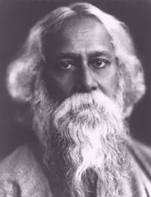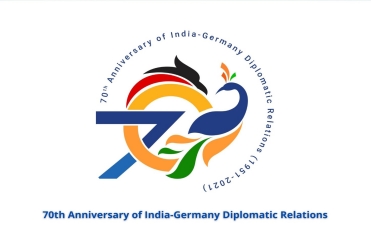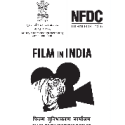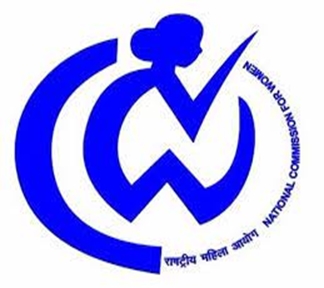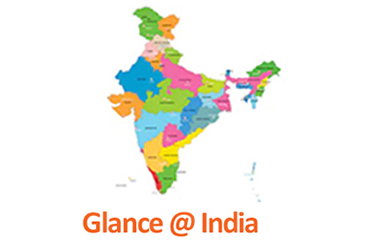|
The name Rabindranath Tagore needs no introduction to anybody associated with India. The first Nobel Laureate of India, Tagore is a symbol of Bengali identity and culture. Two countries of the world use his compositions as their national songs. Tagore was foremost a poet, but he was also a gifted musician, a novelist and even a painter. As a poet, his repertoire is incredibly vast, it is difficult to conceive of any emotion that has been left unexpressed by him, through his poetry and of course, his music. The latter, is a unique blend of East and West, where he combines the diverse themes of Indian classical music, the ragas, with evocative poetry to form his own unique brand of music called Ravindra Sangeet.
Dr. Martin Kämpchen studied German Literature, Theatre, European Philosophy and French in Vienna and Paris, completing with a Ph.D. on German Holocaust and Modern War Literature. He then taught German in Kolkata for three years, after which he did an M.A. in Indian Philosophy at Madras University and a second Ph.D. at Visva-Bharati, Santiniketan, in Comparative Religion, on a comparison of Sri Ramakrishnan and Francis of Assisi. He lives at Santiniketan since 1980 translating Tagore’s poetry from Bengali to German and wrote Tagore’s German biography and produced several books on Tagore’s relationship with Germany in English, German and Bengali. The Indian Institute of Advanced Study published Rabindranath Tagore in Germany: Four Responses to a Cultural Icon in 1999. Kämpchen discovered Tagore’s correspondence with his German translator, Helene Meyer-Franck, and published it in English and in German translation. Further, Martin Kämpchen has translated the five volumes of the Srisri Ramakrishna Kathamrita, the conversations of Ramakrishna with his disciples, into German. He has also translated and edited a selection of Swami Vivekananda’s works.
…………………………………………………………………………………………………………………………
Der Name Rabindranath Tagore ist sicher nicht nur Indien-Kennern ein Begriff. Als erster Nobelpreisträger des Landes ist er ein Symbol der Identität und Kultur. Zwei Länder der Welt verwenden seine Kompositionen als ihre nationalen Lieder. Tagore war vor allem ein Dichter, aber er war auch ein begnadeter Musiker, Schriftsteller und Maler. Als Dichter war sein Repertoire unglaublich groß. Es ist kaum möglich, eine Stimmungslage zu finden, die nicht von ihm poetisch oder musikalisch aufgegriffen wurde. Seine Musik ist eine einzigartige Mischung aus Ost und West, in der er die vielfältigen Themen der klassischen indischen Musik mit klangvoller Poesie verbindet - seine einzigartige Musik Ravindra Sangeet.
Dr. Martin Kämpchen studierte Germanistik, Theater, Europäische Philosophie und Französisch in Wien und Paris. Danach lehrte er drei Jahre Deutsch in Kolkata, machte seinen M.A. in indischer Philosophie an der Madras University und einen zweiten Ph.D. an der Visva-Bharati, Santiniketan. Er lebt seit 1980 in Santiniketan, übersetzte Tagore‘s Poesie von Bengalisch ins Deutsche und schrieb Tagore‘s deutsche Biographie. Daneben schrieb er mehrere Bücher über Tagore‘s Beziehung zu Deutschland. Das Indische Institut für Fortgeschrittene Studien veröffentlichte 1999 Rabindranath Tagore in Deutschland: Vier Antworten auf eine kulturelle Ikone. Kämpchen entdeckte Tagore‘s Briefwechsel mit seiner deutschen Übersetzerin Helene Meyer-Franck und veröffentlichte sie in englischer und deutscher Übersetzung. Außerdem hat Martin Kämpchen die fünf Bände des Srisri Ramakrishna Kathamrita, die Gespräche Ramakrishnas mit seinen Schülern, ins Deutsche übersetzt. Er hat auch eine Auswahl von Swami Vivekanandas Werken übersetzt und bearbeitet.
|
|
Embassy of India
Tiergartenstr. 17
10785 Berlin
Bus 200 Tiergartenstraße
|
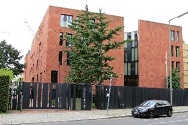 |
Free entry to all events for a maximum of 200 guests with valid Indian, German or other valid ID cards/passports having German stay permits. EU citizens may carry copies of their local registration certificate. Bags are not allowed.
Information: 030-25795-105/-405
Freier Eintritt für maximal 200 Gäste mit gültigen indischen, deutschen oder anderen gültigen Personalausweisen/Reisepässen mit Aufenthaltsgenehmigung für Deutschland. Das Mitführen von Kopien ihrer örtlichen Anmeldebescheinigung ist für EU-Bürger notwendig. Taschen sind nicht erlaubt. Informationen: 030-25795-105/-405
|
















